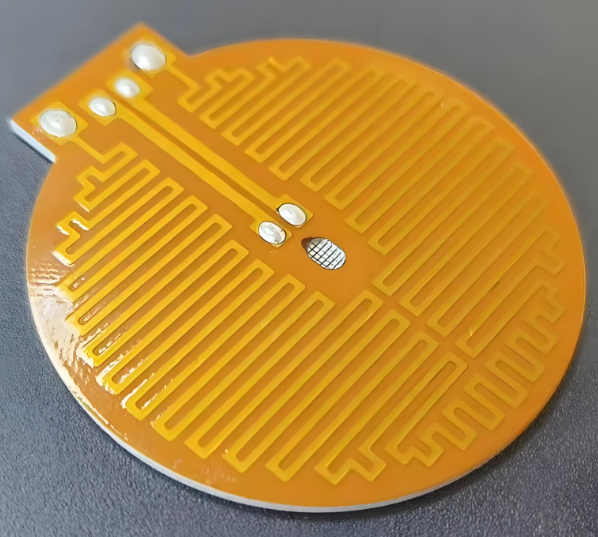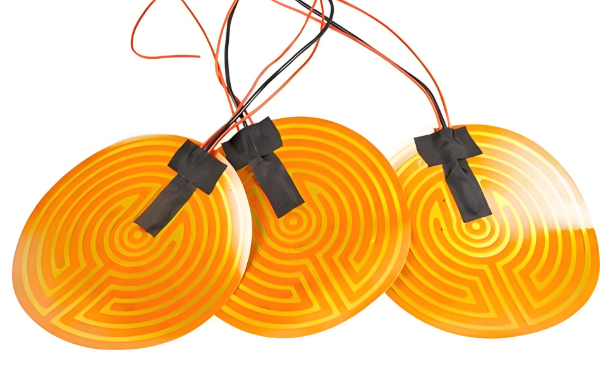PI film, short for polyimide film, is widely used in flexible heaters, FPCs, and insulation materials for its high temperature tolerance, mechanical strength, and flexibility. In applications like PI heating films, the film thickness affects performance, reliability, and heat distribution.
Let’s look at the most common PI film thickness options and how they are selected for different engineering needs.
The common PI film thickness combinations include:
These options are widely used for flexible heaters because they balance heat conduction, insulation, and mechanical strength.
A thinner polyimide film, such as 13µm, provides excellent flexibility for curved surfaces. Meanwhile, thicker options like 50µm improve durability and resistance to mechanical stress. The adhesive layer enhances bonding between the heating circuit and the PI surface, ensuring stability during repeated heating cycles.

PI heater film thickness has a direct influence on how fast and evenly the surface heats up. A thinner film transfers heat quickly and responds faster to temperature changes. This is ideal for small or precision heating zones.
On the other hand, thicker films retain heat better, offering a more uniform temperature profile and stronger insulation. They are suitable for high-power or long-duration applications, such as industrial drying or defrosting systems.
Choosing between thin and thick depends on whether you value quick heating or temperature stability more.
Selecting the right PI heater film thickness depends on your application type and working environment.
For compact devices or wearable products, thinner films (13µm–25µm) are preferred due to their flexibility and low mass. These heaters bend easily around irregular shapes without damaging the circuit.
For high-power or large-area heaters, a thicker film (50µm PI + 25µm adhesive) handles higher temperatures and mechanical stress better. It also resists tearing during installation.
If your application requires fast temperature ramp-up, prioritize thinner films. If it needs steady heat with minimal fluctuation, thicker films will serve you better.

The polyimide layer provides the structural base and electrical insulation. The adhesive layer bonds the copper or etched foil circuit to the film. When combined, they form the total heater thickness that defines performance.
For instance, a 25µm PI + 25µm adhesive heater totals around 50µm in overall thickness. However, the mechanical and thermal characteristics rely more on the base film than the adhesive. The adhesive mainly supports bonding strength and durability under heat cycling.
Yes, PI heater films can be customized to fit specific needs. Manufacturers like Best Technology can adjust both the PI and adhesive thickness based on power density, voltage, and application environment.
Custom designs are often required for rapid heating, extreme temperature ranges, or complex shapes. For example, a thinner polyimide film may be chosen for medical heating pads, while thicker versions are used in aerospace applications where insulation and mechanical stability are crucial.
The key is to communicate your heating goals clearly—such as target temperature, heating time, and surface area—so engineers can match the proper thickness for consistent results.
Many overlook the importance of adhesive layer thickness, but it has a big effect on heat transfer and mechanical bonding.
The choice should align with your power density and operational cycle.

Accurate measurement of PI heater film thickness ensures stable thermal performance. Common methods include micrometer gauges, laser thickness measurement, and optical inspection.
During production, each layer is tested separately—the polyimide base, adhesive, and etched foil circuit. Thickness control within ±5µm is usually acceptable for most industrial applications.
Regular thickness testing helps prevent uneven heat distribution and premature heater failure. It also maintains quality consistency during large-volume production.
Thinner PI films often support higher power density because heat transfers quickly across the surface. However, this comes with trade-offs—excessive density without proper control can damage the heater.
For instance, a power density up to 1.2W/cm² is safe for standard PI heaters under dry heating conditions. For smaller heaters, it may go up to 3W/cm², but temperature control becomes essential.
Thicker films distribute heat more evenly but require more power to achieve the same temperature rise. Balancing film thickness with your power design ensures both safety and efficiency.
If the PI film is too thin, it may heat too quickly and risk hot spots, especially without good temperature feedback. It’s also more prone to tearing during installation.
If it’s too thick, response time slows down, and flexibility decreases. This might not fit compact devices that require bending.
PI film thickness directly impacts how your heater performs in real-world use. Whether you need a thin, fast-response film or a thicker, high-insulation type, selecting the correct combination ensures safety, stability, and long lifespan.
At Danyu Electronics, we provide custom PI heaters using different PI film thicknesses according to customer requirements. Our team evaluates voltage, power density, and application environment before finalizing each design.
We use high-quality polyimide films and adhesives that meet UL and RoHS standards, ensuring superior consistency and reliability.
If you’re unsure which PI film thickness suits your application, our engineers can help you choose the most efficient and safe configuration for your specific needs.
1. What is the thinnest PI film used for heaters?
The thinnest PI film typically used is 13μm. When combined with adhesive, the total thickness ranges from 28μm to 38μm. It’s best for compact or flexible devices where space is limited.
2. Does thicker PI film slow down heat transfer?
Yes, thicker PI films have slightly lower heat transfer rates. However, the difference is small and often compensated by better insulation and temperature stability, especially in high-voltage designs.
3. Can I request a custom PI film thickness?
Absolutely. Many manufacturers, including Danyu Electronics, support custom thickness configurations based on voltage, power, or environmental conditions.
4. How does adhesive thickness affect performance?
Adhesive thickness impacts bonding strength and insulation. Thicker adhesive improves insulation but may reduce heat transfer speed slightly. A proper balance is chosen based on the application.
5. Which thickness is most popular for PI heaters?
The most common and versatile configuration is 25μm PI + 25μm adhesive, offering excellent durability, insulation, and flexibility for general heating applications.
Simply drop your email or phone number in the contact form, and we'll promptly reply you shortly.